I woke in dazed confusion after a fitful night’s sleep. Mid-morning light, already heavy with the heat of the day, pierced the thin cotton of our roof. After suffering the torment of the train’s bare-metal bedspread, a thin, plastic-covered mattress on the floor of an open-sided Bedouin tent – Choum’s only accommodation – had been a vision of pure luxury. That image withered somewhat under the sun’s scrutiny. Our kit lay strewn around our beds, blackened and brittled with ferrous residue. I rose stiffly and ran a quick diagnostics check. Internal physiology: somewhat rearranged, thanks to our cart’s ceaseless shudder. Lungs: charred, in part due to the particles of iron ore that had hung thick in the air, and also to the small-pleasure-cigarettes I’d shared with Adrien during some of the journey’s bleaker moments. Joints: battered and bruised from the hammering of the cart’s unforgiving floor. Eyes: red raw, another dust-related casualty. The list went on.
For my fellow campers the night’s torment hadn’t ended with the train. Fat flies had swarmed them as they slept. In their wakeful moments, they’d made the palindromic connection between Choum and Mouche (the French word for fly). An unfortunate stroke of fate. Luckily, as a Brit who’s language permits no such clever wordplay, I’d been spared the night’s airborne interruptions; though, I imagine my rudimentary mosquito net did some of fate’s heavy lifting. It was a lazy morning. The tasks of cleaning kit and washing bikes felt unusually arduous. Soon, we discovered why. Since being deposited in the heart of the Mauritanian Sahara, temperatures had soared. We’d been swept up from the temperate coastal climate – whose days peaked in the mid-twenties – and deposited in a veritable furnace. By midday it was 40 degrees. Having forced down some couscous, whose texture was an all too familiar reminder of the cocktail of dust and sand we’d ingested through the night, we pedaled out of Choum and into the heart of the desert.
Gov.uk is clear when it comes to travel advice for inland Mauritania. In short, it goes a little like this: Don’t! Many of the world’s governments use traffic-light heat-maps as a visual representation of a particular country’s safety. As the Iron Train plan shifted from fantasy to reality, I delved into these maps. A quick cross-check of the advice from the UK, US and Australian governments gave a clear consensus. Red. Not so easily discouraged, I decided to broaden my research. I’m part of several WhatsApp groups consisting of people who are currently traveling, or have traveled, by bike in Africa. Interestingly, among the cyclists, there was also a consensus. Green. That was decided then. Still, it felt good not to be braving the region alone. The fears that bubble in isolated imagination are tempered by company, especially when that company boasts decades of combined touring experience. So I put on a brave face, if for no other reason else than to avoid looking like a wimp in front of The Pros.
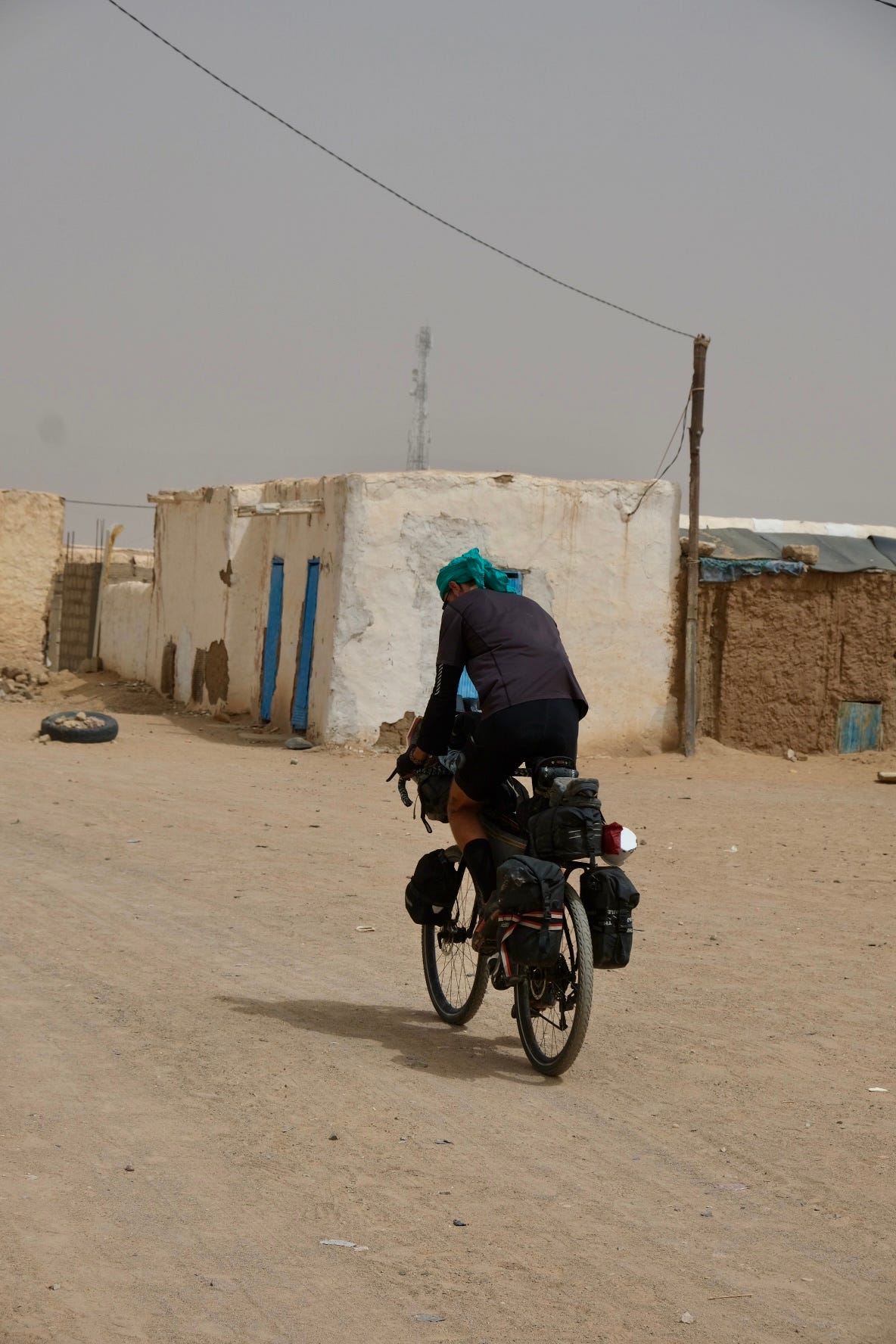
As we settled into our first few kilometres in the saddle, I was reminded of that idea of calibration. After such a significant stretch solo, my group riding was rusty. I certainly wasn’t a slick addition to what I could only imagine was a tightly synchronised riding pair. That first day of riding followed an iterative pattern. I’d start by hanging out at the back of our three-bike peloton, where it was easier to judge the speed. Then, I’d begin to worry I wasn’t pulling my weight, so I’d put the power down and haul Madonna out in front. Fueled by overzealous expectations of what The Pros would consider an acceptable pace, I’d speed ahead leaving the others trailing. Glancing back, I’d realise my mistake and sheepishly freewheel to allow them to catch up. Then I’d do my best to hold a steady cadence, wrapped up in the thought that cycling is so much harder when you’re thinking about it. After a while, I’d tire of all this over-analysing and begin to wonder whether this particular stint of cycling was even serious enough to require aerodynamic formation. Worrying the answer was no, I’d pull out, and ride alongside the group until the drag pushed me right back to last place. There, the cycle would begin again.
Other than the stresses of peloton etiquette, riding in Mauritania was wonderfully free-flow. The hard push through Western Sahara had relieved me of any time pressure, and The Pros were in no rush to reach Dakar, their final destination. So we began to do something I found rather unfamiliar: riding for the love of riding. Adrien had discovered the Amojjar Pass, an isolated strip of tarmac that boasts impressive credentials as Mauritania’s highest road. Ordinarily, I’d give this hard pass a hard pass. It’s 25km from Atar – one the only towns punctuating our journey South – and although the climb itself is paved, the road leading up to it is a viscous concoction of soft sand and jagged rocks. Besides, the pass leads nowhere. Well, technically, that’s not true. It leads to Chinguetti: a medieval trading post and UNESCO world heritage site. But that’s only if you have four wheels, or four legs (with a camel in the middle). For us cyclists, the road disintegrates to nothing more than open desert. In essence, it would be a totally unnecessary, out-and-back diversion from our route to Nouakchott, on some pretty challenging terrain. But it also promised some spectacular cycling.

Now might be a good time to highlight the chasmic gap between the capabilities of our bikes. Sophie and Adrien had repurposed their set-ups from the Atlas Mountain Race; with the addition of an extra bag or two, their race-ready mountain bikes – complete with front suspension – were raring to tackle more tricky terrain. Madonna, on the other hand, besides weighing more than The Pros’ bikes combined, is a rigid gravel bike with drop-handlebars. She’s no stranger to brief forays on loose terrain but she’s not exactly purpose built. Forget apples and oranges; think suburban SUVs and all-out Monster Trucks. Despite her disadvantages, Madonna coped remarkably well on the journey out. Or so I thought. Our progress was slow and churning. The mid-afternoon sun had nudged temperatures higher: a quick check of our weather apps showed the extent of our punishment. 47 degrees. In this heat, we were drinking close to two litres an hour, laboriously filtered from the local wells. But at least our dawdling pace allowed me time to carefully pick a line. The track’s sweet spot was a half-metre-wide strip, somewhere between the soft sand of the edge and the washboard ridges of the middle. Keeping Madonna on course was an exercise in acute concentration. By the time we finally reached the climb, a little under two hours later, I was weary. At least, from here, the road was paved.
The brief relief of smooth tarmac quickly gave way to a wave of nausea. Despite the roasting heat, my forearms prickled with goosebumps. It was a strange sensation; something like the chill you feel watching someone with real talent performing their carefully honed skill. I kept my eyes glued on the tarmac running beneath my front tire, imagining Madonna was the foot of a sewing machine stitching a swift line of thread through the centre of the road. As the minutes of intense effort wore on, and we crawled further up the climb, the back of my throat became impossibly dry. My larynx felt like a foreign object. I tried not to swallow. It was all I could do not to gag. But, eventually, we crested Amojjar’s final bulge. While we waited for Sophie, Adrien noticed a tattered, polka-dot cycling cap lying in the sand beside him. As I later learnt, this is the cap awarded to the strongest climber in the Tour de France each year. No wonder the pass had felt tough. This really was Pros territory.
I took the descent cautiously, knowing my brake pads would fade fast in the fierce heat. Careering off a hairpin was low on my list of priorities. Talk about embarrassing… We rested in the shade of one of the valley’s few trees and, instinctively, I gave Madonna a quick once over. My investigation bore worrying results. Not one but both of the rims of her wheels had begun to crack. And she wasn’t through the woods yet. Another 25km of chunky gravel lay ahead, retracing our steps to Atar. All I could do was let out her tires in the hope of cushioning the ride. We set off as a three but soon, Sophie and Adrien were distant specks on the horizon. The wind was at our back and their lightweight mountain bikes floated like magic carpets over the chatter of the track. As I gently coaxed Madonna along, she began to protest, bucking like a petulant mule. Before long, I found myself sprawled in the dirt. Luckily, The Pros were out of sight. After the minor crash, Madonna decided she was tired of changing gears. Since the train, her shifting had been sticky; the ubiquitous grime had worked its way deep into every crevice. The additional plume of grit, kicked up as we hit the deck, had sealed the deal. The mechanism seized and I began to entertain the possible reality of cycling to The Gambia without gears. Things were not going well.
We camped that evening on the rocky plains just South of Atar. As Sophie and Adrien prepared our trademark couscous, I tinkered. With some careful cleaning – and a dribble of the bike-tourer’s best friend: lube – the frozen shifter loosened up. I felt immensely grateful for that little victory. The day’s heat draped itself over us long after the sun had disappeared beyond the horizon. We all opted to camp without our fly-sheets, hoping a breeze would be sufficiently cooling to make sleep possible. In the end, we got slightly more than we bargained for. A desert storm whipped our tents through the night, coating us in yet more grime as sand worked its way through the thin mesh of our bare tents. We’d agreed a departure time of 7am, to get some riding under our belt before the heat got its act together. But, thanks to the sleepless night, by the time I finally stirred at 10-to, The Pros were already packing the last of their kit. As you know by now, there’s little I hate more than packing under pressure. By the time we hit the road, I was irritable and already impatient for the day to be over.
With another scenic detour planned – this time to the Terjit Oasis, a haven of luscious green nestled in the terracotta tapestry of the Adrar Plateau – we once again left the safety of the N2. At least this time it was paved… mostly. The oasis was stunningly beautiful. But beauty comes at a price. There was a steep admission fee to paradise. Relative to Mauritania’s population, tourism is extremely low: figures from 2019 estimate that there’s 2700 locals to every tourist. So it’s no surprise that locals are looking for any opportunity to increase their basket spend. Terjit’s bubbling streams sung a convincing siren song. By now, the second skin of dust we’d all adopted had begun to develop its own microbiome. We were in dire need of a soak. But, thanks to the inherent frugality of our breed of travelers, these songs fell on deaf ears. We took one last longing look at the crystalline waters, filled our bottles from the village well, and left slightly crustier than we’d arrived.
Not long back on the road South, I crashed again. This time in full view of The Pros. I’d found myself deep in conversation with Sophie, both lounging on our aerobars as we pedaled. As my attention was drawn from the road, Madonna began to drift. I told you my group riding was rusty. Before I could stop her, she’d slipped off the tarmac and buried her front wheel in the sand. I, in turn, flew over the bars and skidded across the skillet-hot tarmac. Miraculously, neither of us suffered major damage. My only injury was a deadening impact to my lower back, where I’d landed hard on a pudgy pouch of raisins. As I fished the amorphous blob from the back of my bibshorts, I concluded the raisins had come off worse. Not ones to indulge in too long a pause – even in the case of man overboard – The Pros soon had me back in the saddle. I was grateful for their pragmatism. After all, we had a long ride ahead of us if we were to make it to Akjoujt before dark. Akjoujt is the only other major town on the road between Choum and Nouakchott. An essential refuel point. It was 3pm, and we had 100km to ride. There was no doubt about it, aerodynamic formation was required.
So began a three hour battle with my body. When riding long distances, I usually keep a strict separation between mind and body. Like breathing, the automatic rhythm of pedaling takes far more energy if you try to control it. Instead, I aim for complete dissociation: trusting my body to do what’s needed, and my mind to keep from interfering. During this particular stretch of riding, however, such separation was impossible. My head pounded in the oppressive heat; my back ached from its battles with raisin and road; and most of all, I felt dangerously close to throwing up. From a very early age, I’ve hated being sick. It was, for a long time, a crippling phobia. Luckily, youthful binge drinking did its part in providing some well-needed exposure therapy. I’m much better these days but the thought of vomiting still fills me with mild dread. What’s more, as I rode, I became obsessed with the idea that if I had to pull over to be sick, that would be the end of my time with The Pros. Now this might sound as if I’m painting Sophie and Adrien as ruthless elitists; let me assure you, nothing could be further from the truth. But in my slow-roasted, sugar-starved, road-rattled brain, I’d created a false narrative. To avoid bringing my dreamt-up fears to life – being left abandoned and ashamed in a pool of my own vomit in the Mauritanian desert – I focused on breathing calmly. The only way I could do this was to keep my mouth full of water, diverting all respiratory responsibilities to my nose.
I rode for close to two hours like this: swallowing my tepid oral cargo on occasion, then forcing down handfuls of dates before reloading. After what felt like an eternity, the nausea abated, and I sensed myself coming back to life. As I escaped my false, fearful fantasy, I realised that reality was quite different. Sophie and Adrien were far from coasting. In fact, we were all suffering together. Faced with this realisation, I began to feel my fluidity return. Our riding synchronised as we took turns on the front, scything through the barren landscape. Before long, we were sat cocooned by our circle of tents, cradling bowls of couscous, allowing the sweet prospect of sleep to wash over us.
Now, you might be thinking that, through all this, I’m giving more weight to the miserable than the magical. And you’d be right. You see, when you feel like you’re taking a beating, it’s hard not to get caught up in the negatives. But during these days, suffering through the desert’s relentless heat, soaking up the punishment of the road, with Madonna falling apart around me, I learned something. The challenges you face only have the power to bring you down if you give it to them. Basic stuff, I know – easy to dismiss as textbook self-help drivel – but how many of us really put this knowledge to good use? I know I often don’t. Riding with The Pros through the heart of Mauritania, I had an epiphany: I’m in a remote and sublime landscape, on a once-in-a-lifetime adventure; it wouldn’t be right if things weren’t going wrong. The beauty is in the struggle. Perhaps I was simply numb with exhaustion but inside my battered body, my mind soon found peaceful repose. Parts can be replaced, bruises heal, and by God, I’ll ride in single-speed to The Gambia if that’s what it takes! Despite the toll it had taken on both me and Madonna, I wouldn’t have missed this detour for the world. For all its discomfort, the Iron Train had unlocked the wonders of inland Mauritania. And, for all her scars, Madonna will always know, deep in the Italien-forged Dedacciai steel of her tubing (ok, fine, her bones), that she rode that landscape. Just as I’ll know it in mine.





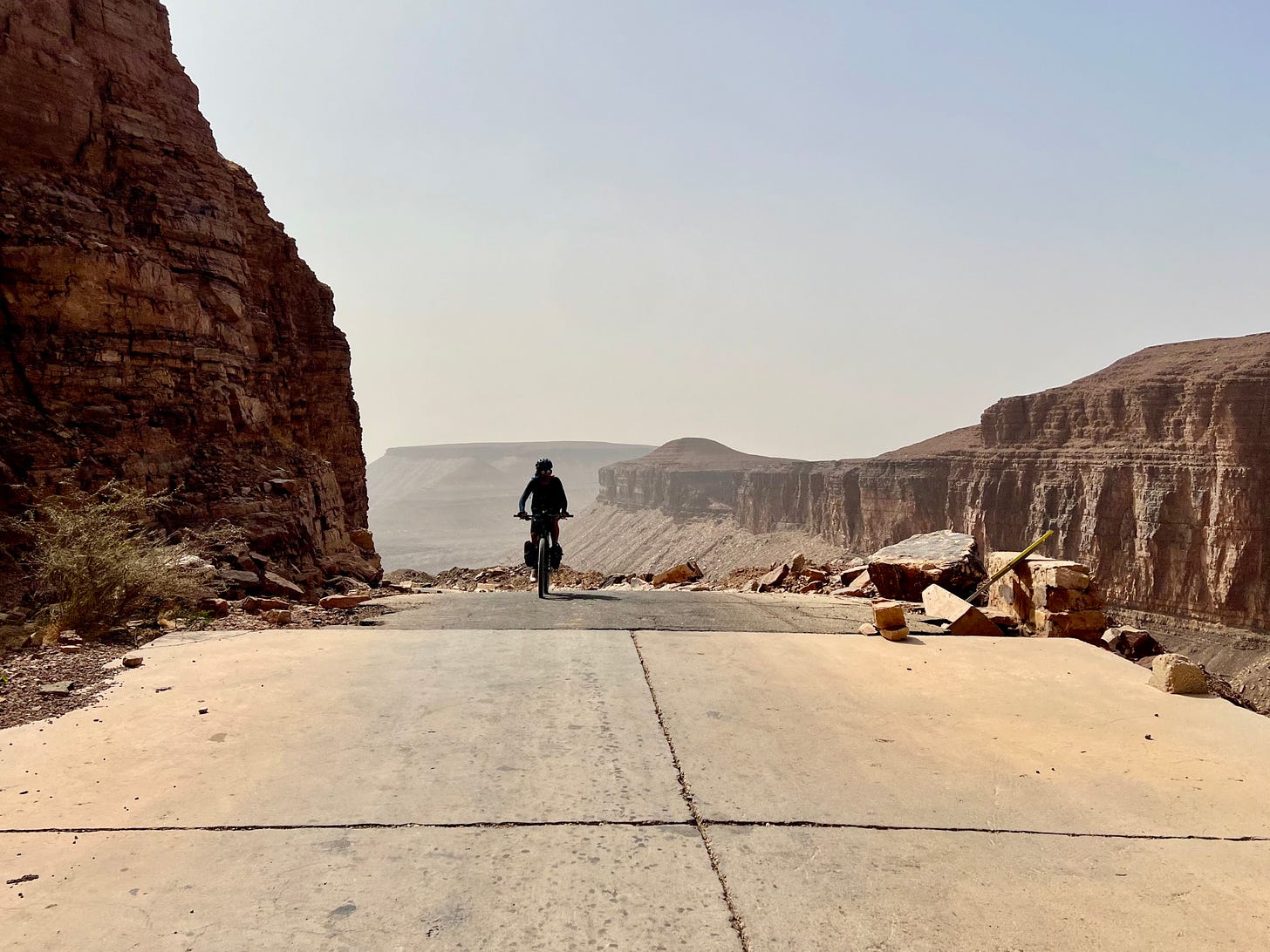
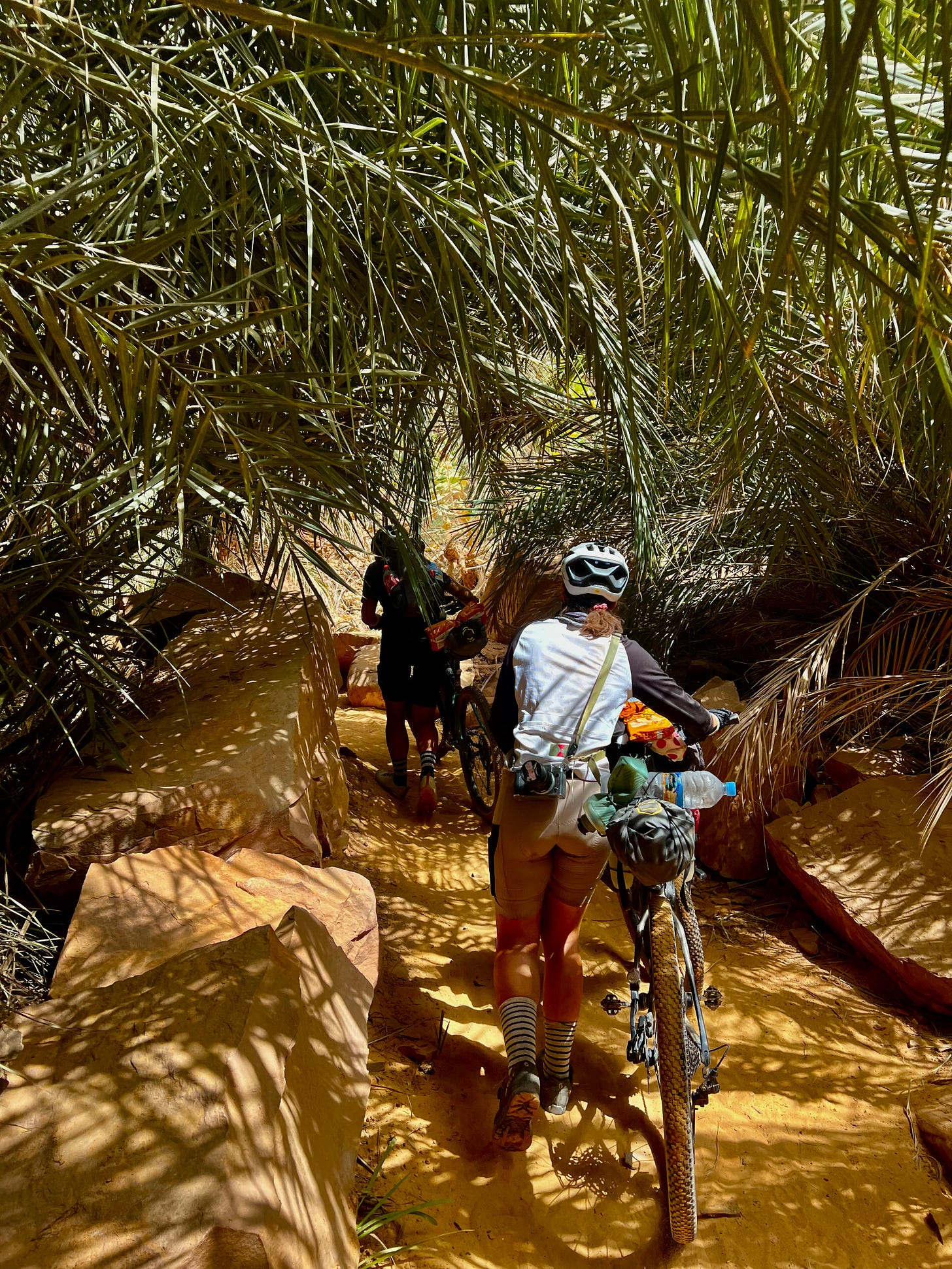
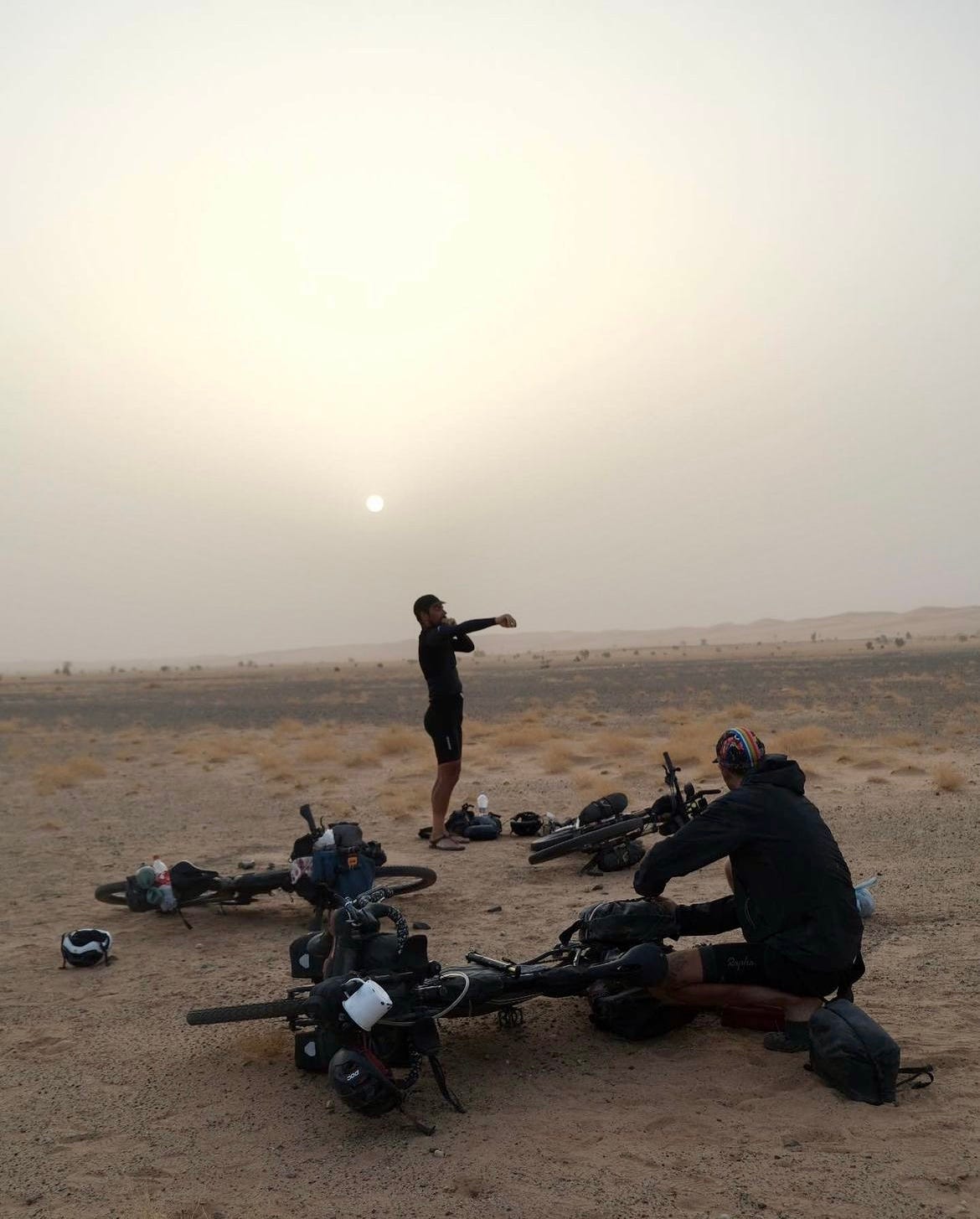
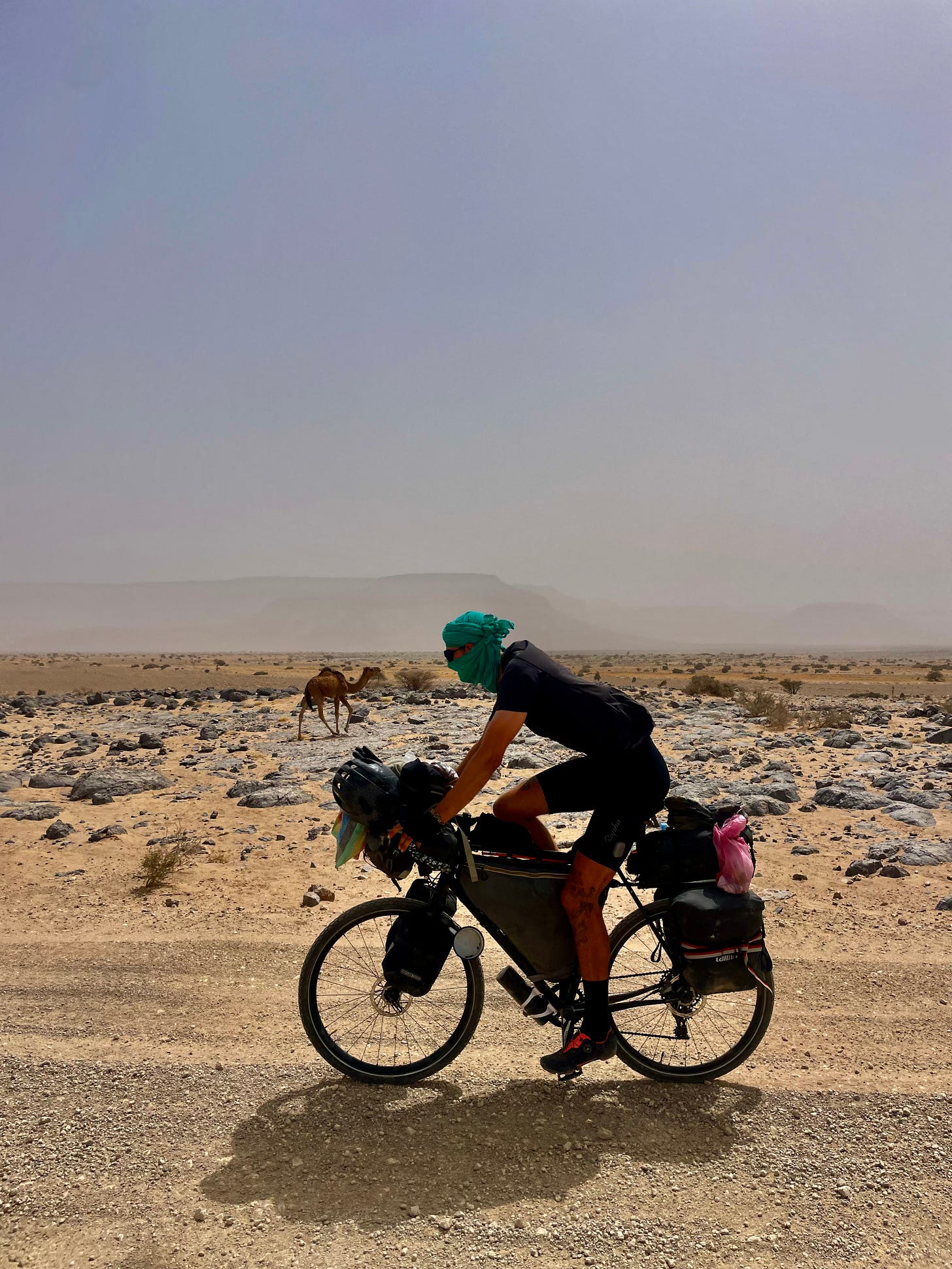
Iron train, iron man! Wasn’t it Mandela who said “the struggle is my life”?! You’re getting through your own struggle amazingly well! 👏😉
Thinking of you and your dusty dinners - but you’re so right , doing a small part wrong shows how right the rest of everything is …. Epic Mr Thorpe ! Sending Mother-in law type hugs xx